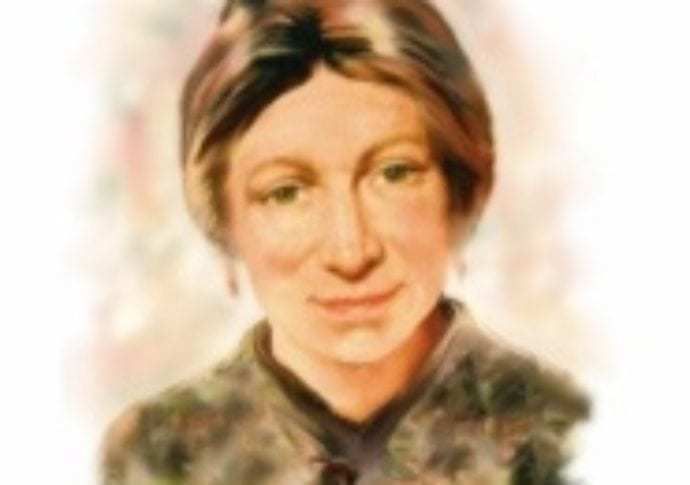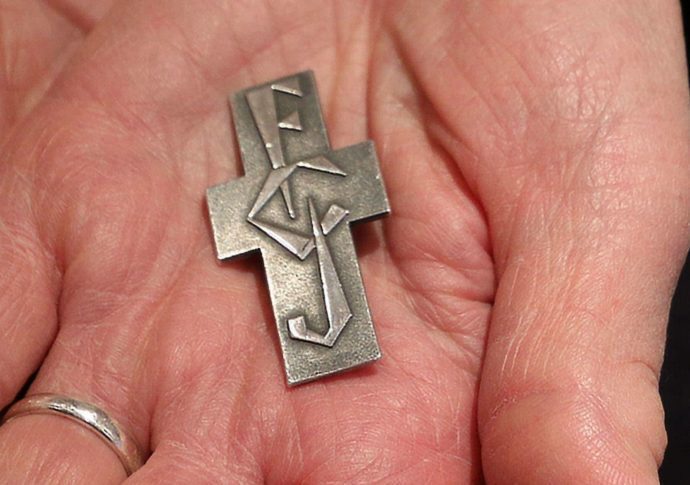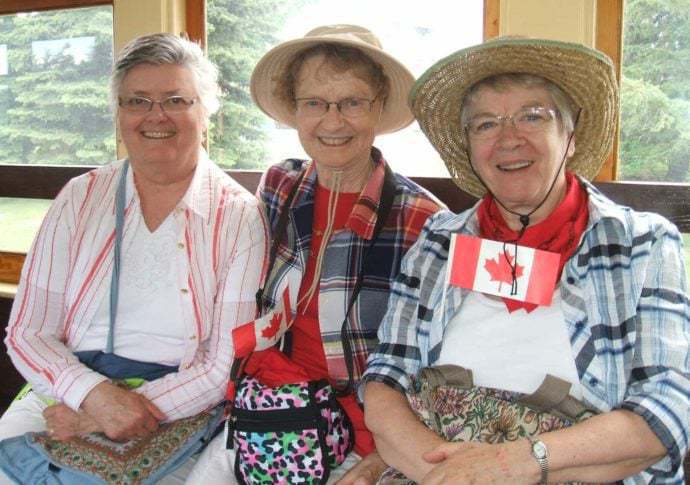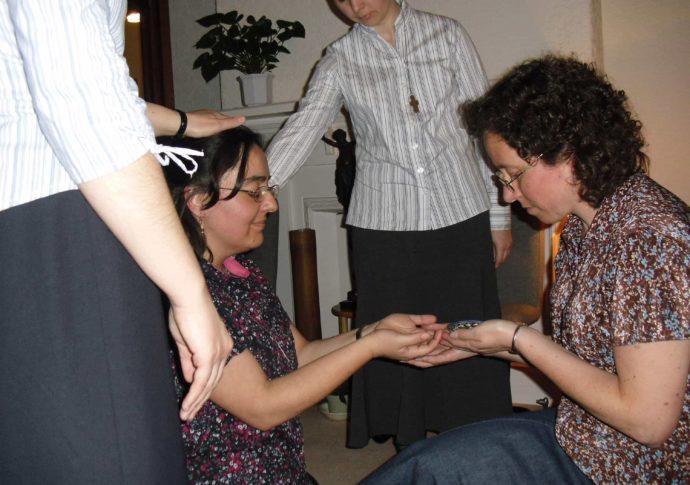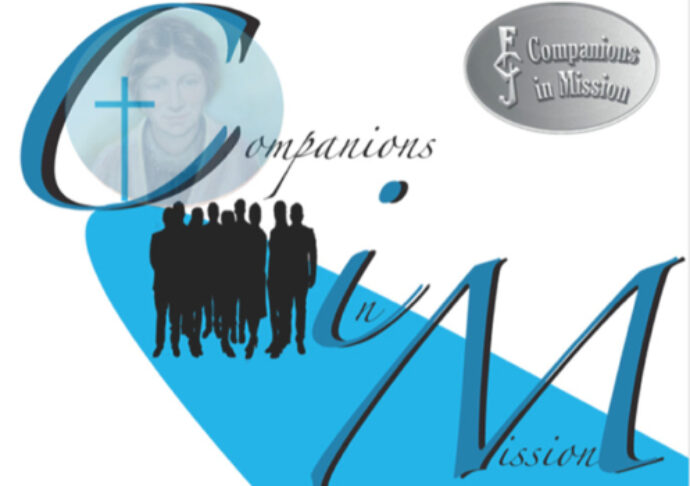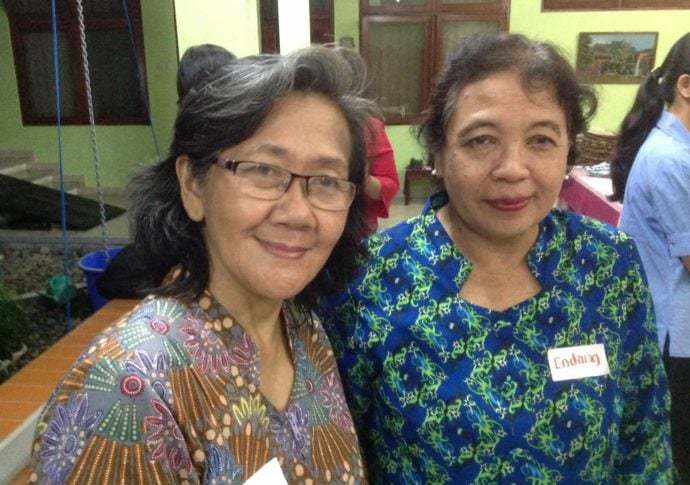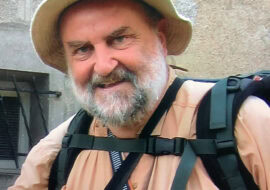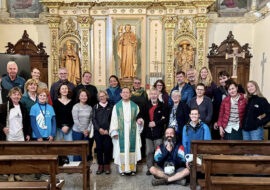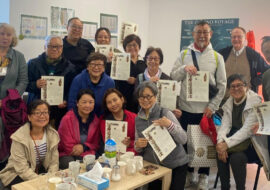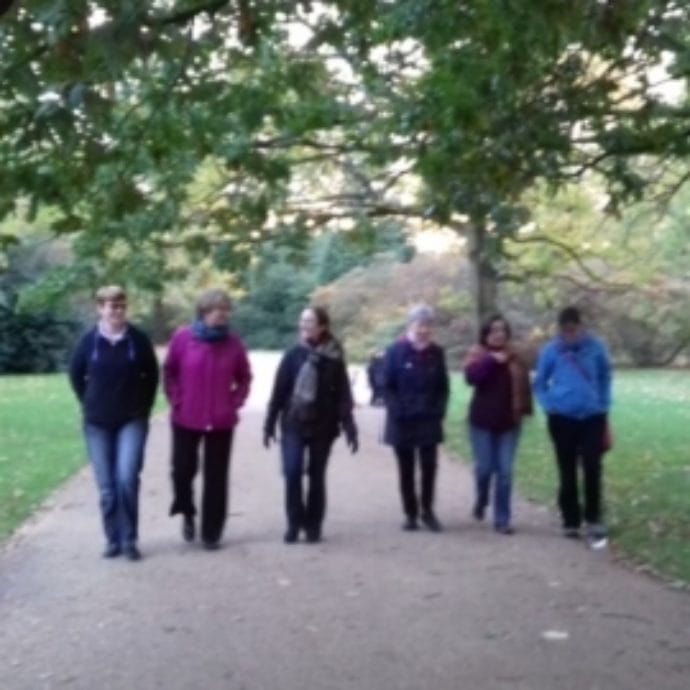Camino Companions is an FCJ project in Santiago de Compostela to offer pilgrims a space to articulate and find meaning at the end of their Camino. This piece by Sr Katherine Mary fcJ, first appeared in the Conference of Religious of England and Wales website, reflects on the experience of welcoming pilgrims in Santiago.
Many who reflect on mission in religious life today speak of the importance of encounter, finding the liminal spaces where the searchers gather and walking alongside those who are lost, confused and burdened. The Camino to Santiago could be described as such a place.
Along the winding paths between St. Jean Pied de Port and Santiago, it becomes normal to encounter people in a very real way and to discover that all human beings are on the same journey. As one pilgrim described it, “whether you are CEO of a multinational or a homeless person, what you need on the Camino is much the same, a bed for the night, something to eat, a walking companion and good feet!”
The lines from T.S. Elliot we had the experience but missed the meaning can be true for some pilgrims who do not have an opportunity to put words on their experience before returning home.
The Camino is also a liminal space. Everyone is away from their usual routine and many of the usual societal mores do not apply, e.g. it is not unusual for a strange man to bandage the feet of a woman he has just met or for another pilgrim to offer her/his bed or a treasured bottle of water to someone in greater need. People tell their secrets to strangers on the Camino and often give voice to fears and hopes they have never shared. The lines from T.S. Elliot “we had the experience but missed the meaning” can be true for some pilgrims who do not have an opportunity to put words on their experience before returning home.
The ‘Faithful Companions of Jesus’ Sisters began an outreach to pilgrims in Santiago in 2015. The Association of Dutch Pilgrims and the German Bishops had already established places of welcome for pilgrims coming from the Netherlands and Germany. Mass in English was available for English language pilgrims but there was no “space” where pilgrims could gather throughout the day to share their experiences and reflect on their Camino. The Dean of the Santiago Cathedral encouraged the FCJ sisters to provide this opportunity for English language pilgrims and offered space in a corridor room adjacent to the office where pilgrims received their “Compostela” – a certificate awarded to those who walk at least 100 kms on one of the Camino routes.
In 2017 a new International Pilgrim Centre was opened. This enabled all of the language groups to have quite a spacious private room where they could welcome pilgrims. A welcome space for French speaking pilgrims was also opened at that time.
 Throughout the past eight years with the exception of 2020 and 2021, the FCJ sisters have been present in Santiago from Easter to the end of October. We have been blessed with generous volunteers – mostly former pilgrims – who desire to give back to the Camino. Several lay women and some men, a number of Religious from other congregations, FCJ lay Companions in Mission, an Australian diocesan priest and an ordained Anglican woman have offered their time and gifts to welcome and be available to pilgrims. Most of the volunteers live and work with us for a two or three week stint. We collaborate with a Filipino priest – a Camino aficionado, Fr. Manny Domingo sdb – who celebrates Mass in English each day in the small chapel at the Pilgrims Office.
Throughout the past eight years with the exception of 2020 and 2021, the FCJ sisters have been present in Santiago from Easter to the end of October. We have been blessed with generous volunteers – mostly former pilgrims – who desire to give back to the Camino. Several lay women and some men, a number of Religious from other congregations, FCJ lay Companions in Mission, an Australian diocesan priest and an ordained Anglican woman have offered their time and gifts to welcome and be available to pilgrims. Most of the volunteers live and work with us for a two or three week stint. We collaborate with a Filipino priest – a Camino aficionado, Fr. Manny Domingo sdb – who celebrates Mass in English each day in the small chapel at the Pilgrims Office.
Pilgrims who visit us come not just from countries where English is spoken but also from many other countries as far flung as Korea, China, Russia, Indonesia, Taiwan, Israel, Turkey, many of the eastern European countries and several African countries. Pilgrims of all faiths and none are welcomed as they share their experience of the Camino which not surprisingly, is often connected to their journey of life.
We have encountered people at a depth which does not happen often in the busy rat race of life. We have heard the most amazing stories of courage and human endurance. Pilgrims have come in wheelchairs pushed by their family and friends. Partially sighted pilgrims have struggled up steep mountain sides led sometimes by people they know, at other times by complete strangers. Parents have carried their babies and little children along the Camino, sometimes in gratitude for their safe arrival or for some this has been a means of opening their children’s minds to God as they go on pilgrimage.
For some pilgrims, the Camino is a place where they feel they can deal with a bereavement or a breakdown in a relationship. Quite a few pilgrims carry the ashes of a loved one and say goodbye as they walk the Camino. Some pilgrims choose to walk as they face a crossroads in life, a time of transition and change. Quite a few people set out as tourists walking what has become a celebrity hike as seen on some recent TV programmes on the Camino. Some of those tourists become pilgrims as they journey towards Santiago.

Such encounters at the end of the Camino provide a wonderful opportunity to listen compassionately and to value each one’s experience and search for meaning. The long days of solitary walking provide pilgrims with time to explore some of the deeper human questions and they are glad of a safe space to share their thoughts and feelings as they end their Camino. The beauty of the landscape comes alive for many pilgrims as they slow down and experience the majesty of the Pyrenees, listen to the glory of the dawn chorus, smell the fragrance of the Eucalyptus trees and delight in the wooded pathways lit by a slanting sun. Such experiences often lead pilgrims to marvel and be grateful for the One who created such magnificence.
One of the sayings loved by pilgrims is the Camino provides.
One of the sayings loved by pilgrims is “the Camino provides.” This attitude leads them to a sense of trust in providence whether it is in finding a bed for the night, often in common dormitories along with other noisy pilgrims, or in getting the help they need at a challenging time. Pilgrims discover that they need very little for their journey. Those who set off with a large backpack, often find themselves reducing their load as they go along, an invitation to live more simply. Many return home determined to get rid of their clutter!
The kindness of strangers is another common experience on the Camino. Other pilgrims reach out and offer support to those who are struggling and share their food and other essentials with those in need. The contrast with the grab and greed of life is not lost on pilgrims and the call to be more generous, more open to others from all walks of life, all countries and creeds is one of the “take aways” for many as they return home.

Following the yellow arrows along the Camino day after day for a week, a month or several months, having no agenda other than to walk to the next place of rest empties the mind of much of the clutter which is so much part of modern life. The support of other pilgrims often provides a kind of family atmosphere and strong bonds develop. Consequently ending this experience on arrival in Santiago, can be disconcerting and confusing for some pilgrims as they say goodbye to their new found friends and the freedom of the road. They are grateful for a place to pause, reflect and make the transition back to their families, work etc.
Many volunteers and FCJ sisters return each summer to Santiago to offer this service of listening and accompaniment and feel immensely privileged and encouraged in their own pilgrimage of life with its days of joy and times of profound challenge.
There are two Caminos, one external and one internal. The external reaches its destination, the internal never does.
Manny Coe
A recent article in The Guardian newspaper describing the Camino of three brothers, one of whom has Down’s Syndrome, gave a very moving account of their journey to Santiago. The final lines of the article were particularly meaningful: “There are two Caminos, one external and one internal. The external reaches its destination, the internal never does.”
Having a place to take stock of the internal Camino is so important for all pilgrims.
Follow Camino Companions on facebook.
Photos taken by volunteers and pilgrims and used with permission.





